Welcome back to This Week in Apps, the weekly TechCrunch series that recaps the latest in mobile OS news, mobile applications and the overall app economy.
The app industry is as hot as ever, with a record 218 billion downloads and $143 billion in global consumer spend in 2020.
Consumers last year also spent 3.5 trillion minutes using apps on Android devices alone. And in the U.S., app usage surged ahead of the time spent watching live TV. Currently, the average American watches 3.7 hours of live TV per day, but now spends four hours per day on their mobile devices.
Apps aren’t just a way to pass idle hours — they’re also a big business. In 2019, mobile-first companies had a combined $544 billion valuation, 6.5x higher than those without a mobile focus. In 2020, investors poured $73 billion in capital into mobile companies — a figure that’s up 27% year-over-year.
This week, we’re taking a look at Clubhouse’s breakout moment — or moments, to be fair. Also, the App Store’s rules were updated, Parler’s CEO was fired and other companies began raising their own red flags about Apple’s privacy changes.
This Week in Apps will soon be a newsletter! Sign up here: techcrunch.com/newsletters
Top Stories
Clubhouse goes mainstream
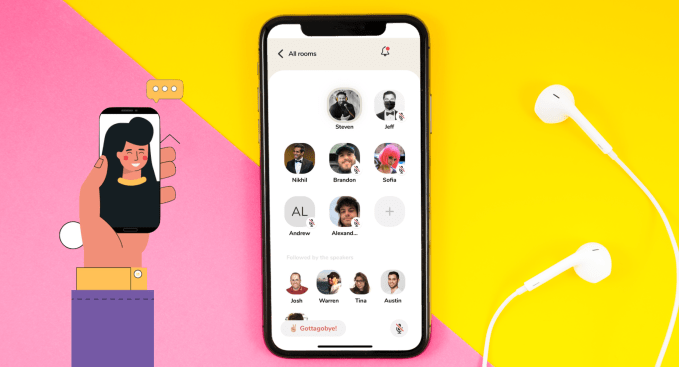
Image Credits: Freepik / Kristina Astakhova (opens in a new window) / Getty Images
The invite-only audio platform has been on a roll, and has already hosted big names in tech, media and entertainment, including Drake, Estelle, Tiffany Haddish, Kevin Hart, Jared Leto, Ashton Kutcher, and others in the Silicon Valley tech scene. But this week was a breakout if there ever was one, when on Monday, Tesla and SpaceX founder Elon Musk showed up on Clubhouse, topping the app’s limit of 5,000 people in a single room. With others unable to get in, fans livestreamed the event to other platforms like YouTube, live-tweeted, and set up breakout rooms for the overflow. Musk was later joined by “Vlad The Stock Impaler,” aka Robinhood CEO Vlad Tenev, who of course talked about the GameStop saga — and was then interviewed by Musk himself.
Then on Thursday, Clubhouse saw yet another famous guest: Facebook CEO Mark Zuckerberg, who casually went by “Zuck23” when he joined “The Good Time Show” talk show on the app, as Musk had done before him.
The format of the social media network allowed the execs to informally address a wide audience of listeners with whatever they want to talk about — in Musk’s case, that was space travel, crypto, AI and vaccines, among other things. Zuckerberg, meanwhile, used the time to talk about AR/VR and its future in business and remote work. (If you thought Zoom meetings were bad…).
(And who knows, maybe he wanted give the app a try for other reasons, too.)
There is something unsettling about this whole arrangement, of course. Soft-balled questions lobbed at billionaires, journalists blocked from rooms, and so on — all on an app financed by a VC firm, Andreessen Horowitz (a16z), that’s said to be interested in cutting out the media middleman, to “go direct” instead. (Not coincidentally, the room inviting the big name guests was co-hosted by a16z’s Andreessen and its new GP, Sriram Krishnan, who is described as having an “optimistic” outlook — perhaps a valuable commodity when much of the media does not.)
Regardless of the machinations behind the scenes that made it happen, it’s hard to ignore an app where the biggest names in tech show up to just chat — or even interview one another.
Where is all this going?, is a valid question to be raised. Some have described Clubhouse as the late-night talk show equivalent. A place where interviews aren’t about asking the hard questions, but rather about whatever the guest came there to say or promote. And that’s fine, of course — as long as everyone understands that when big names arrive, they may do so with an agenda, even when it seems they’re just there for fun.
In any event, Clubhouse proved this week it’s no longer a buzzy newcomer. For now, at least, it’s decidedly in the game.
Companies (besides Facebook) warn investors about Apple’s privacy changes
So far, it may have seemed as if the only two businesses taking real issue with Apple’s privacy changes, including the coming changes to IDFA, were Facebook and Google. Facebook took out full-page ads and weighed lawsuits. Google delayed iOS app updates while it figured out privacy labels. But as other companies reported their fourth-quarter earnings, IDFA impacts were also topping their list of concerns.
In Snapchat CEO Evan Spiegel’s prepared remarks, he alerted investors to the potential disruption to Snap’s ad business, saying that the privacy changes “will present another risk of interruption” to advertising demand. He noted that it was unclear what the long-term consequences of those changes may be, too. Unity, meanwhile, attached a number to it: IDFA changes would reduce its revenue by about 3%, or $30 million, in 2021.
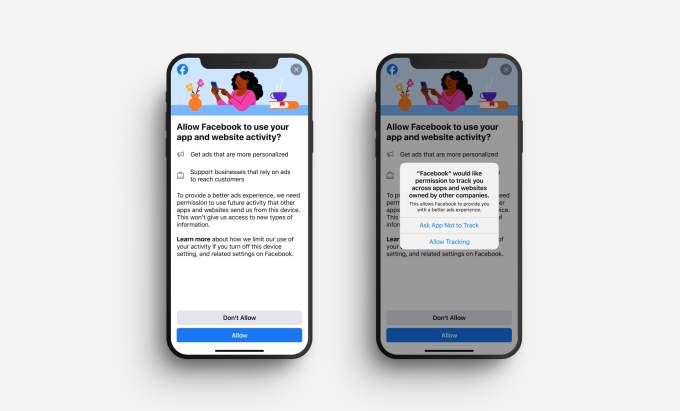
Image Credits: Facebook
It may be that no one really knows how damaging the IDFA update will be until it rolls out. These are only estimates based on tests and assumptions about user behavior. Plus, there are reports poking holes in Facebook’s claims, which had said that small businesses would suffer a 60% cut in revenues. Those are surely overstated, Harvard Business Review wrote, saying Facebook had cherry-picked and amplified its numbers.
Nevertheless, Facebook is already testing ways to encourage users to accept its tracking. The company on Monday began showing some users prompts that explained why it wants to track and asked users to opt in so Facebook can “provide a better ads experience.” Users could tap “allow” or “don’t allow” in response to the prompt.
Apple updates its App Store Rules
Apple said these were moderate changes — just clarifications and tweaks that had been under way for some time. For example, the new App Store Guidelines now include instructions about how developers should implement the new App Tracking Transparency rules. Another section details how developers can now file an appeal upon an app review rejection.
Other changes are more semantic in nature — changing person-to-person experiences to “services” to broaden the scope, for example, or to clarify how gaming companies can offer a single subscription that works across a variety of standalone apps.
To see what actually changed, go here.
Parler CEO fired
Parler — the app banned from the App Store, Google Play, Amazon AWS, using Okta, etc., etc. — fired its CEO, John Matze, this week after struggling to bring the app back online. According to reports from NPR and others, the firing was due to his disagreement with conservative donor Rebekah Mercer, who controls Parler’s board. Matze argued the app would need to crack down on domestic terrorism and groups that incite violence in order to succeed, he says, but claims he was met with silence. Parler, meanwhile, said those statements were misleading.
After Parler’s rapid deplatforming following the events at the Capitol, other alternative social networks climbed up the charts to take its place. But these apps have not proven themselves to have much staying power. Instead, the top charts are once again filled with the usual: Facebook, Instagram, YouTube, TikTok, Snapchat, etc.
Maybe it’s actually no fun yelling about the world when no one is around to challenge you or fight back?
Weekly News
Apps with earnings news
- Snap beats with revenue of $911 million in Q4, up 62% YoY, versus $857.4 million expected. Snap’s DAU’s climbed 22% YoY to 265M. But stock dropped over a weak Q1 forecast.
- PayPal reported stronger-than-expected, pandemic-fueled earnings with EPS up 25.58% YoY to $1.08, beating the estimate of $1.00. Revenue was $6.12 billion up 23.28% YoY year, which beat the estimate of $6.09 billion. The company added 16 million net new accounts, bringing the total to 277 million.
- Related, Venmo’s TPV grew 60% year over year to $47 billion, and its customer base grew 32%, ending just shy of 70 million accounts. The company expects its revenues will approach $900 million in 2021.
- Spotify reports revenue growth of 17% YoY to €2.17 billion; 345M MAUs, up 27% YoY; and paid subs to 155 million, up by 24%.
Platforms: Apple
- The iOS 14.5 beta arrives with a number of notable new features, including most notably, ATT and the ability to unlock your iPhone when wearing a mask, as long as you’re also wearing an Apple Watch. Other changes include worldwide dual-SIM 5G support, AirPlay 2 support for Apple Fitness+, support for PlayStation 5 DualSense and Xbox Series X controllers, support for T-Mobile’s standalone 5G network, a new Siri feature for calling emergency services, a toggle to disable emergency alert sounds, emoji search for iPad, and other small changes in the Reminders, News and Podcasts apps, and more.
- Code in the iOS 14.5 beta also suggests new financial features like Apple Card Family for multiuser accounts and a new framework FinHealth that gives automated suggestions to improve your finances.
- Apple rolls out new and updated design resources for building apps across its platforms, including iOS 14 and iPad OS 14, tvOS 14 and macOS Bir Sur. On mobile, the new design resources for Sketch have been rebuilt to support color variables, and include numerous minor improvements and bug fixes.
- Apple’s services saw a significant outage this week that impacted, among other things, the App Store, leading to blank pages, broken search results and more.
- Certain U.S. states will allow casino, sports and lottery games from March 1, 2021. Google already announced a change to Play Store policies, to allow these. In Apple’s updated App Store Guidelines, out this week, it also added “gambling” as one of the app categories that had to be submitted by a legal entity — an indication that it was opening its doors, too.
- App Store growth hit a six-month high in January 2021, Morgan Stanley said, citing Sensor Tower data that indicated App Store net revenue grew 35% YoY in the month. In Japan and Germany, growth reached 60% and in the U.S. it was 42% YoY, due to pandemic impacts.
- Some users are saying third-party apps have been crashing after syncing an iPad or iPhone with an M1 Mac.
Platforms: Google
- Huawei’s HarmonyOS is being pitched as an original in-house creation, but Ars Technica took a deep dive and found it was really just an Android fork.
- “Millions” of Ford vehicles will use Google’s Android OS to power their infotainment systems, starting in 2023.
- Google is said to be exploring its own alternative to Apple’s new anti-tracking feature, which may seem counterintuitive, as Google is in the ads business. But according to a report from Bloomberg, the company is looking into a solution that’s “less stringent” than Apple’s. That could provide some pushback in terms of setting an industry standard.
Gaming
- YouTube launches Clips, a short-form video feature that lets users clip 5 to 60 seconds of a video and share with others, similar to Twitch’s clips feature. The feature is in limited alpha testing.
- Epic Games is warning Australia’s market regulator to take action against Apple for using its market power to force developers to pay a 30% commission on paid apps and IAP. Epic is suing Apple in the country, but wants the regulator to step in now.
- In the U.S., a judge orders a 7-hour deposition from Tim Cook in the Epic vs. Apple lawsuit.
- Google hasn’t killed game streaming service Stadia yet, but it did announce this week it’s stepping away from first-party games. The company also announced the Stadia Games and Entertainment head Jade Raymond was leaving the company, while the existing staff would be moved to other projects.
- Amazon Luna’s game streaming service expands to more Android devices, including Pixel 3, 3XL, 3a, 3a XL; Samsung S9, S9+, Note 9. The service was already available on new Pixel, Samsung and OnePlus devices, among others.
Augmented Reality
- Color of Change launches The Pedestal Project, an AR experience on Instagram that allows users to place statues of racial justice leaders on the empty pedestals where confederate leaders once stood (or anywhere else). At launch, there are three featured leaders included: Rep. John Lewis, Alicia Garza and Chelsea Miller.
- TikTok partners with WPP to give WPP agencies access to ad products and APIs that are still in development, including new AR formats.
Security & Privacy
- YouTube adds its App Store privacy label, detailing the data it uses to track users. This includes your physical address, email address, phone number, user and device ID, as well as data linked to you for third-party advertising and for app functionality, product personalization and more.
Fintech
- Venmo is turning into a financial super app with additions that include crypto, budgeting, saving and shopping with Honey — all of which are planned for this year.
- Robinhood CEO Vlad Tenev has been asked to testify before the House Financial Services Committee on February 18, over the GameStop debacle. The app still hasn’t recovered its reputation — Play Store reviews have gone back down to 1.0 stars, even after a purge.
- Reddit has its best-ever month in terms of installs, thanks to the “meme stocks” frenzy driven by users of the r/wallstreetbets forum. The app gained 6.6 million downloads in January 2021, up 43% month-over-month, growing its total installs to date to 122.5 million across iOS and Android.
- Cash App also this week had to halt buying meme stocks like GameStop, AMC, and Nokia after being notified by its clearing broker of increased capital requirements.
- Robinhood raises another $2.4 billion from shareholders after its $1 billion raise from investors to help it ride out the meme stock trading frenzy.
- Joompay, a European rival to Venmo and TransferWise, has now launched in the market after obtaining a Luxembourg Electronic Money Institution (EMI) license.
Social & Photos
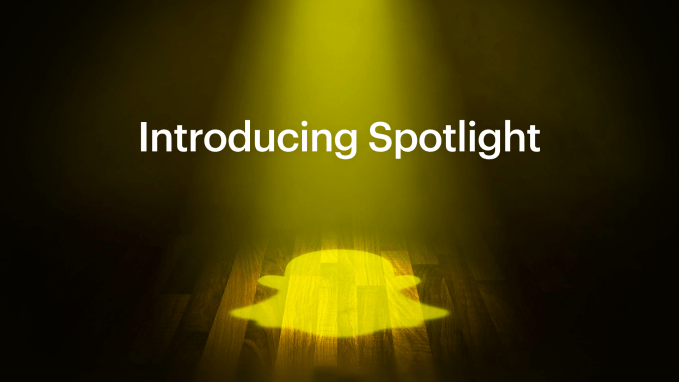
Image Credits: Snap
- Snapchat’s TikTok rival “Spotlight” now has 100 million MAUs, the company said during earnings, and is receiving an average of 175,000 video submissions per day. But Snap is heavily fueling this growth by paying out over $1 million per day to the top-performing videos — everyone wants to be TikTok, it seems.
- TikTok says it will now downrank “unsubstantiated” claims that fact checkers can’t verify. The app will also place a warning banner overtop these videos and discourage users from sharing them with pop-up messages.
- TikTok owner ByteDance sues Tencent over alleged monopoly practices. The suit claims that Tencent’s WeChat and QQ messaging services won’t allow links to Douyin, the Chinese version of TikTok.
- Instagram confirms it’s developing a “Vertical Stories” feed that will allow users to flip through users’ stories vertically, similar to TikTok.
- IRL, an events website and mobile app, has topped 10 million monthly users as it revamps itself into a social network for events, now including user profiles, group events, and chat.
- Instagram bans around 400 accounts linked to hacker forum OGUsers, where members buy and sell stolen social media accounts. The hackers used SIM-swapping attacks, harassment and extortion to take over the accounts of “OG” Instagram users who have coveted short usernames or those with unique words. Twitter and TikTok also took action to target OGUsers members, the companies confirmed.
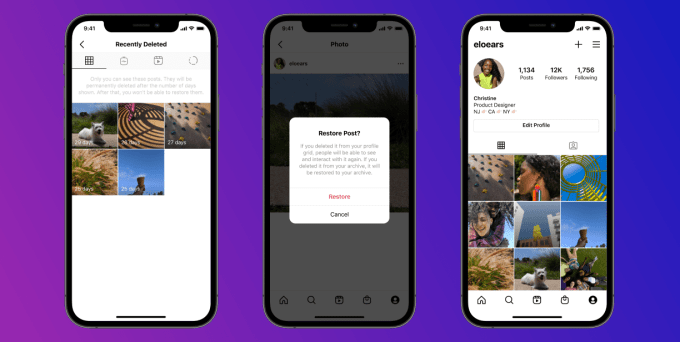
- Instagram adds “Recently Deleted,” a new feature that lets you review and recover deleted content. The company says it added protections to stop hackers from accessing your account to reach these items. Deleted stories that are not in your archive will stay in the folder for up to 24 hours. Everything else will be automatically deleted 30 days later.
- Triller ditches its plans to do a Super Bowl ad and will now host a fan contest instead. The app has struggled to present a challenge to TikTok in the U.S. market.
- Daily Twitter usage remained consistent despite Trump ban, according to data from Apptopia.
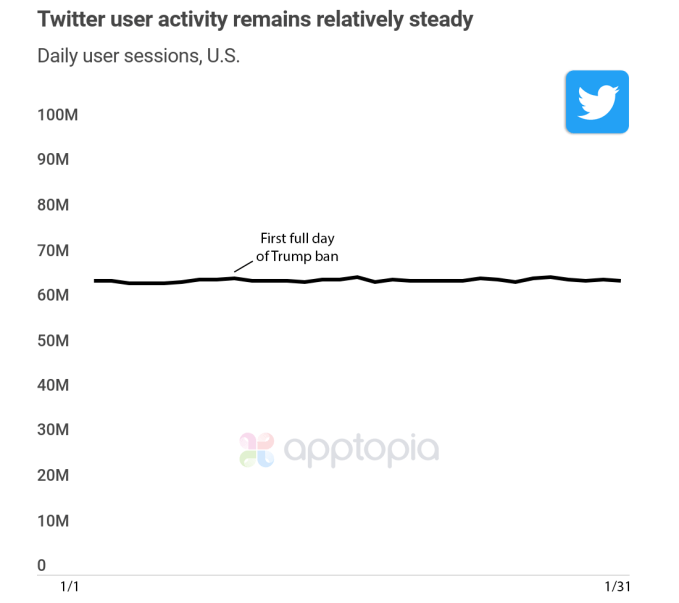
Image Credits: Apptopia
Communication and Messaging
- Element, a client for federal chat protocol Matrix, was removed from the Play Store this week, for abusive content. But Google made a mistake. This was a third-party client, not the content’s host. And it had already removed the content, based on its own rules. For those unfamiliar, Element is an open network that offers both unencrypted public chatrooms as well as E2EE content. Eventually, the developer got a call from a Google VP who helped the app get reinstated. But the situation, which resulted in 24 hours of downtime, raised a question of how well app stores are prepared to moderate issues that crop up in decentralized platforms and services.
- Clubhouse CEO Paul Davison confirmed the company will introduce a subscription tool that will allow creators to make money from their rooms.
- Telegram, benefitting from the shift to private messaging and the WhatsApp backlash, became the most-downloaded app overall in January 2021, across both app stores and on Google Play. On the App Store, it was No. 4 and TikTok was No. 1.
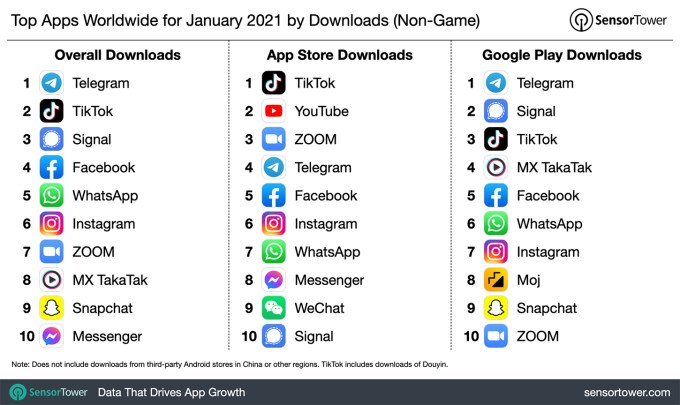
Image Credits: Sensor Tower
Streaming Services and Media
- Apple-owned Shazam adds iOS 14 widgets for the first time, allowing you to quickly ID any song that’s playing and see your history.
- Spotify adds new playlists, podcasts and takeovers for Black History Month, and creates a new “Black History Is Now” hub in the app.
- The U.S. version of the Discovery+ mobile app gets more first-month downloads (3.3 million) than HBO Max did (3.1 million), Apptopia found. But it’s not an apples-to-apples comparison, as existing HBO NOW users were upgraded to Max.
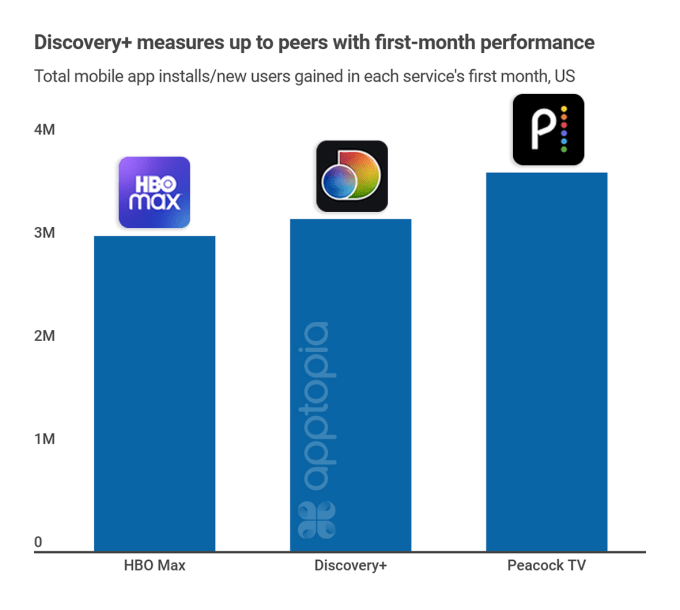
Health & Fitness
- The Google Fit app on Pixel devices is getting an update that will allow your phone’s camera to measure pulse and breathing rates.
Productivity
- Microsoft rebrands its document scanner app Office Lens to Microsoft Lens and adds new features, including Image to Text, an Immersive Reader, a QR Code Scanner and the ability to scan up to 100 pages. Lens also now integrates with Teams, so users can record short videos to be sent through Team chats. Uh, TikTok’s about documents, I guess?
Government & Policy
- Myanmar’s military government orders telecoms to block Facebook until February 7, following coup. The government, which seized power following an election, said the social network is contributing to instability in the country.
- TikTok will recheck the age of every user in Italy, following an emergency order from the GPDP issued after the January 22 death of a 10-year-old girl who tried the “blackout challenge” she saw on the app. On February 9, every user will have to go through the TikTok age-gate again.
Funding and M&A
- Uber buys alcohol delivery service Drizly for $1.1 billion. Drizly’s website and app let users order alcohol in markets across the U.S. but is often hampered by local liquor laws. Gross bookings were up 300% YoY, ahead of the deal.
- Vivino, a wine recommendation and marketplace app, raises $155 million Series D led by Sweden’s Kinnevik. The app now has 50 million users and data set of 1.5 billion photos of wine labels.
- Mobile ad platform and games publisher AppLovin acquires Berlin-based mobile ad attribution company Adjust in what’s being reported as a $1 billion deal, but is reportedly less. The deal comes at a time when the ad attribution market is being dramatically altered by Apple’s ATT. Mobile Dev Memo explains the deal will give Applovin visibility into which games and driving conversions for Adjust customers, to benefit its own ad campaigns.
- Latitude, a startup that uses AI to build storylines for games, raises $3.3 million in seed funding. Its first title is AI Dungeon, an open-ended text adventure game.
- Chinese social gaming startup Guangzhou Quwan Network Technology raises $100 million Series B from Matrix Partners China and Orchid Asia Group Management. The company provides instant voice messaging, social gaming, esports and game distribution and operates voice chat app TT Voice, which has over 100 million users.
- Consumer trading app Flink, a sort of Robinhood for the Mexican market, raises $12 million Series A led by Accel.
- Commuting platform Hip, which offers both an online dashboard and mobile app, raises $12 million led by NFX and Magenta Venture Partners. The app works with bus and shuttle providers to plan routes for commuters and offers COVID-19 tracing services.
- Bot MD, a Signapore-based app that offers doctors an AI chatbot for looking up important information, raises $5 million Series A led by Monk’s Hill Ventures. The funds will help the app to expand elsewhere in the Asia-Pacific region, including Indonesia, the Philippines, Malaysia and India.
- Meditation and sleep app Expectful raises $3 million in seed funding for its app aimed at new mothers. The company plans to expand the app to become a broader wellness resource for hopeful, expecting and new parents.
- Brightwheel, an app that allows preschools, daycare providers and camps to communicate with parents raises $55 million in a round led by Addition, valuing the business at $600+ million. Laurene Powell Jobs’s Emerson Collective and Jeff Weiner’s Next Play Ventures also participated.
- ELSA, a Google-backed language learning app co-founded in 2015 by Vietnamese entrepreneur Vu Van and engineer Xavier Anguera, raises $15 million a round co-led by Vietnam Investments Group and SIG.
- Financial super app Djamo gets Y Combinator backing for its solution for consumers in Francophone Africa.
- Bumble IPO filing sets price range for up to $1B. The dating app makers aims to sell 34.5 million shares at $28 to $30 apiece, valuing the business potentially at $6.46B.
Downloads
Reese’s Book Club
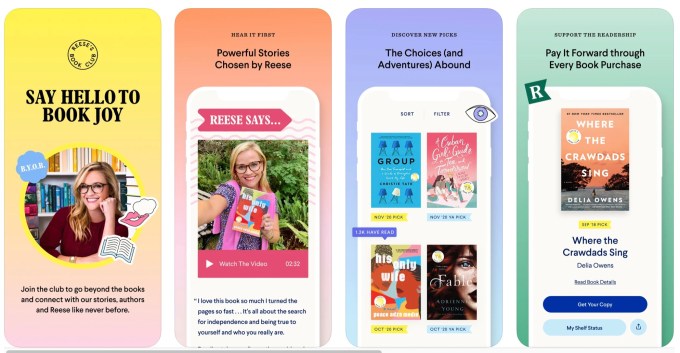
Image Credits: Hello Sunshine Apps
Actress and producer Reese Witherspoon’s media company Hello Sunshine has launched an app for Reese’s Book Club — the book club that focuses on diverse voices where women are the center of their stories. The book club today has nearly 2 million Instagram followers and 38 book picks that made The New York Times bestseller list. Its books have also been adapted into film and TV projects, including Hulu’s “Little Fires Everywhere,” upcoming Amazon series “Daisy Jones and the Six, Netflix’s “From Scratch,” and forthcoming film “Where the Crawdads Sing.”
The new app lets users keep track of the new monthly picks, browse past selections, join community discussions with fellow readers, hear from authors, compete for prizes and, soon, buy exclusives items that will help fund The Readership, a pay-it-forward platform aimed at amplifying diverse voices and promoting literacy, which may include efforts like installing book nooks in local communities and supporting indie booksellers.
The app is a free download on the App Store and Google Play.
Carrot Weather
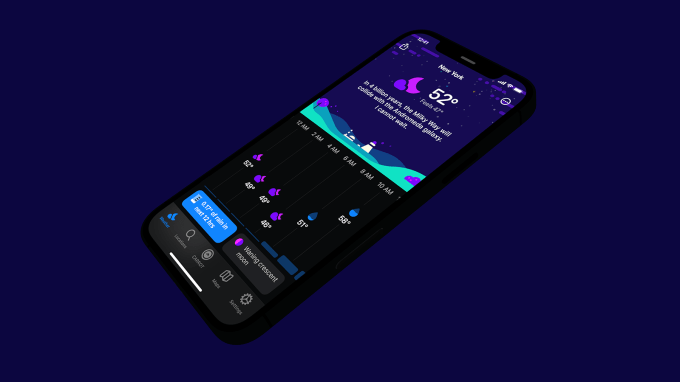
Image Credits: Carrot Weather
Everyone’s favorite snarky weather app received a major overhaul toward the end of January, which includes a redesigned interface, new icons, tools to design the UI how you want it (an “interface maker”), new “secret locations” (a fun Easter egg) and more. The app has also switched to a vertical layout that fills the screen with information, which also includes smart cards that bubble up with weather info when it’s needed. Carrot Weather is also now a free download with subscriptions, instead of a paid app.
Powered by WPeMatico

 (@sal19)
(@sal19) 





